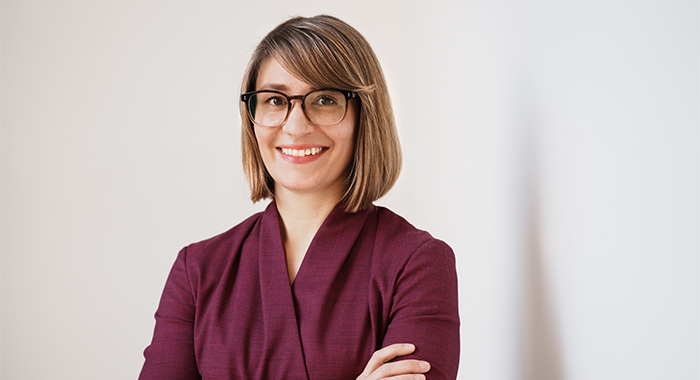Scientist Reimagines Lab Work
The head of digitalization in research and development for the dispersion and resins department at the largest chemical producer in the world, BASF, is a borderline savant at breaking down complex ideas — and titles — so they click for the novice.
“Digitalization is what we think first and foremost as automation, but that is only a small component of it,” explains Irene Gorman ’06. “I like to use the example: If you go to a restaurant, you used to have to make a phone call to make a reservation; now you can just do it online. Waitresses often have tablets now instead of writing orders down. Then you have Uber Eats, which started with online ordering and delivery, but now takes data and opens restaurants based on gaps in the market. That’s digitalization. They’re not just automating the process, they’re using it in smart ways to use data to make money and fill a need.”
Gorman works in Ludwigshafen, Germany, with more than 45,000 colleagues. She oversees around 500 employees working on automating and streamlining tasks in BASF’s labs that are tedious and repetitive. She also leads teams endeavoring to turn qualitative experiments into quantitative ones. An example: “I work with the coating industry, and a very simple test is the scratch resistance of a coating. A way to do that was to scratch a surface and then give it a pass or fail. But there’s not really any data associated with that and there’s a lot of variables that could influence whether a coating passes or fails,” Gorman says. “We’ve taken that experiment and automated it using a series of four robots. We can now measure the exact force that it takes to scratch a surface, how deep it is, how wide it is. ... Later I can use that data for statistical analysis or artificial intelligence.”
She attributes her rising professional career with a dedication to always being open to new opportunities. After high school, she was set on a larger university, but found her way to St. Norbert on a scholarship and chose to study philosophy. She switched majors after taking a chemistry class and was invited to join a summer research opportunity after her first year with Larry Scheich (Chemistry). And over the following two summers, she took part on National Science Foundation programs that paid her to work with graduate students on their research, one being at the University of Southern Mississippi, from where she later graduated with a Ph.D. in polymer science.
“Polymers are a chain of smaller molecules that are all linked together. It’s like a train where all the cars are a different molecule. Some cars can be the same, some could be different. They can have patterns or not. … Depending on how they’re arranged, you can have a rubber band or you could have ballistic glass,” says Gorman. Specifically, she worked with click chemistry whose main researchers were awarded a Nobel Prize in Chemistry in 2022.
Doctorate in hand, Gorman set out to find a job either stateside or in Europe and found her way to BASF. Her biggest project so far was a collaboration with Honda R&D in Japan where they worked to replace steel parts with carbon composite parts, pushing cars to be lighter and more fuel-efficient.
“On a day-to-day basis I’m still working with the data, but I’m not in the lab,” Gorman says. “In that project I was sitting in between a chemical company and an automotive company, in between German and Japanese culture and hardcore organic chemistry and physics. I was able to translate what both sides were saying. I think American culture was a kind of neutral ground between the two cultures, and my favorite part was communicating different ideas.”
“One of the challenging things is what I really like: I have to push people to really change the way they think and the way they work,” she adds. “We’re not trying to replace people in the lab, we’re trying to free them up to do more interesting and beneficial work. … I’m at the front-edge of something new. I get to play around with new tools and the way they work. You can really feel an impact when you uncover something successful.”
Gorman doesn’t miss being hands-on in the lab; she has one at home that’s used daily. “One of my biggest hobbies is cooking and that’s very close to working in a chemistry lab. Most chemists are very good cooks.”
Feb. 20, 2024












